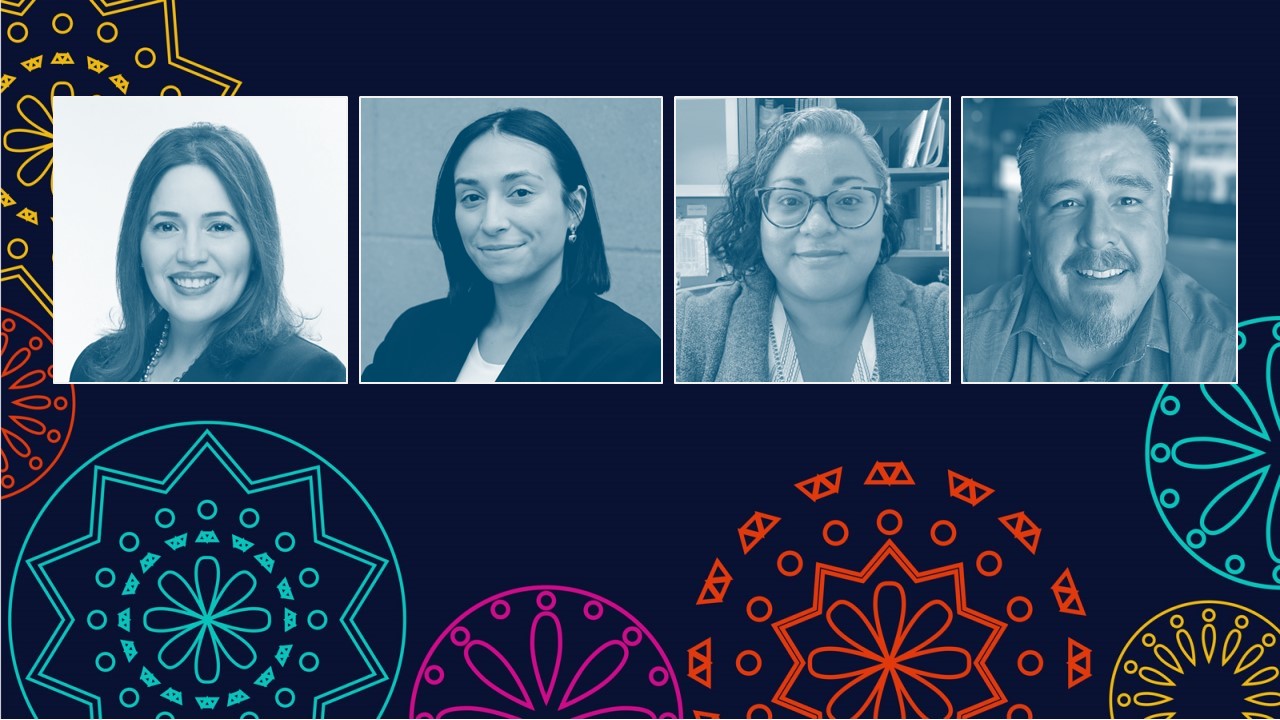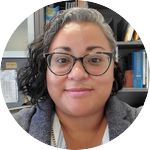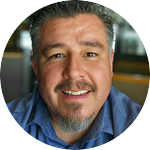
In many Hispanic cultures, madrinas and padrinos are special people in one’s family, serving a role similar to a godparent, who hold places of honor at milestones like weddings and baptisms. When the Local Government Hispanic Network (LGHN) developed its signature mentoring program, it took the name Madrinas y Padrinos to extend the concept of a strong family support system to serve those working in local government.
The program pairs experienced local government leaders with emerging leaders who meet regularly to discuss career advancement, workplace culture, how best to serve diverse communities, and solutions to specific issues. The program is entering its third cycle, with about 80 people participating in the cohort that began in summer 2024, compared with about 26 people in each of the first two cohorts. To get a better idea of how Madrinas y Padrinos serves both mentors and mentees, we asked participants who have finished the program to share their thoughts.

Consuelo Arguilles
Assistant Community Development Director | Warrenville, Illinois, USA
Mentor
I’m first generation Mexican American. I’m one of five kids, and my parents didn’t go to college. They didn’t go to high school, and didn’t really go to grade school either. They come from a remote place in Mexico and immigrated to the United States. I went to public schools and never realized that I was a minority until I started college. For the first time, I was being asked, “Where are you from? ” I would reply, “What do you mean? I’m from Chicago.” And they would say, “No. Where are you from?” That was my first experience getting that question and then being told, “You have a little bit of an accent.”
Starting out in the workforce, connecting with senior leaders in the organization could be difficult. I felt like I had to work twice as hard to demonstrate and prove my worthiness to show I belonged there. I didn’t really have a mentor, and that was part of the problem. When my boss gave his notice, he asked me if I was applying for the job. I said it hadn’t even crossed my mind because I didn’t think that I was qualified. He said that I should go for it, so I applied and I got it. That’s one of the key reasons why now I want to take what I’ve learned and give advice to students who are going into the workforce, especially in government.
The Madrinas y Padrinos program has been my first time as a formal mentor to someone. My mentee and I got started with me asking her about her career: What are you doing now? Do you like it? What do you see yourself doing next and what do you think you need to do to get there?
We worked a lot together on some challenges at her work and how she could address them, and my advice to her on how to get to where she sees herself going. I learned that economic development was one of her focuses, and even though she was not doing that in her current position, an opportunity opened up at work. I said, “You definitely want to express your interest and just be open with your boss and apply for it.” She did not end up getting it, but they were doing some restructuring at her organization and there was another opportunity. They wanted to meet her halfway and retain her.
In my career, I never had an official mentor. Early on, I didn’t know that even existed. Working with my Madrinas y Padrinos mentee took me back to when I was in my first job. It can be scary to navigate the workforce, and I wish I had had a mentor back then.

Laura Castillo
Director, Department of Economic Inclusion Cincinnati, Ohio, USA
Mentee
When I first found out about LGHN, I was blown away at finding so many Hispanics and Latinos in public administration. In a meeting, someone mentioned the Madrinas y Padrinos program, and I was really drawn to it because I didn’t have a mentor. At that point in my career, I had been promoted to the deputy director role for our department, and we had seen a lot of turnover. I had a lot of questions, and I needed some frank and open conversations about navigating a leadership role in a department that had seen so much change.
The ability to ask very candid questions, especially to someone who was a city manager themselves, was absolutely game-changing for me. It was the first time that I was supervising, so to have that extra level of reassurance—trusting my gut instincts—was invaluable.
I remember that some of our first conversations were about how I can contribute to a positive work culture. How do I help our team to really become a team? I remember going into it thinking that I probably need to hire somebody to do team building. And my mentor just said: bring donuts. Make it so that it’s a little bit more approachable, and that’s how you start to really see that kind of connectivity between your team.
Leadership can feel very isolating and lonely, often leading to self-doubt and impostor syndrome. I tell my mentor all the time just how incredibly grateful I am, and I look forward to one day mentoring someone myself.

Marisol Gómez
Assistant Finance Director | Santa Cruz, California, USA
Mentee
When I started working with my mentor through the Madrinas y Padrinos program, I made it clear that I’m not trying to climb the ladder right now. I’m exposed to a lot in my position and there’s a lot that I’m still trying to dip my toe into, so I’m fine to stay in the position I’m in.
I have two bachelor’s degrees, and I know a lot of people in finance have a CPA, a master’s degree, or a certification in public government accounting. So, it was nice talking with my mentor about what might get me back into the classroom. She had a lot of goals for herself, and it was nice to see that even though she had a great position that she really liked, she was still trying to reach for new things. She was also beginning to study for a new certification herself. She said, “I just like to learn.” A position may not require certain certifications; it could just be a personal choice to attain them. I’m in the process of making that final decision. I’m just trying to figure out the schedule and how many classes to take.
Even though the mentorship is through LGHN, we didn’t hyper-focus on issues of identity, and I liked that because everyone comes from different situations. I also appreciated the mix of mentees because I’m not an early career person, so it was nice to be placed with someone who had a lot to share. In the future, I think it would be great to be a mentor myself and be on the other side of the relationship, sharing everything I’ve learned.

Ernesto Chavez
Chief Technology Officer | Lafayette, Colorado, USA
Mentor
I have participated in several mentorship programs throughout my career and enjoy this type of interaction. I have really enjoyed meeting people through LGHN, and I was excited to connect in a mentor/mentee capacity with others from Latin descent.
Early on, my mentee and I talked a lot about career development, but fundamentally we focused on helping her find her voice. We were able to have candid conversations about her frustrations and how to challenge them from a perspective of what she could control or influence. This was especially important when we discussed how to advocate for what she needed from her supervisor and work environment. Seeing her become energized throughout that year was pretty awesome.
Having a shared cultural heritage is not necessary for having a positive mentoring experience. However, having a deep understanding of common themes in our culture expedites the development of a good relationship and allowed us to discuss barriers and perceptions. Although we come from different environments, our shared heritage helped me understand her work experiences and offer an alternative perspective in a meaningful way. Also, I think that being connected through LGHN created a common bond since we both hold that community in high regard.
The best part of the program was being able to contribute to the Latino community and witness an awesome person move from a position of frustration to being motivated and energized, leveraging the skills and abilities she already had to succeed.
To learn more about LGHN, our members, partnership opportunities, and the Madrinas y Padrinos program, contact Christine Butterfield, executive director, at cbutterfield@lghn.org.
New, Reduced Membership Dues
A new, reduced dues rate is available for CAOs/ACAOs, along with additional discounts for those in smaller communities, has been implemented. Learn more and be sure to join or renew today!
